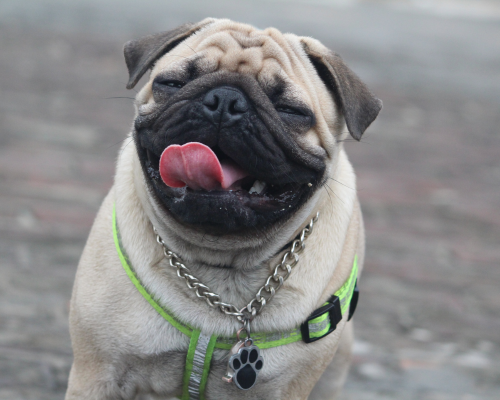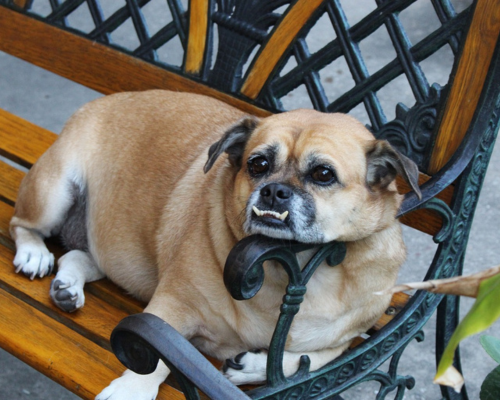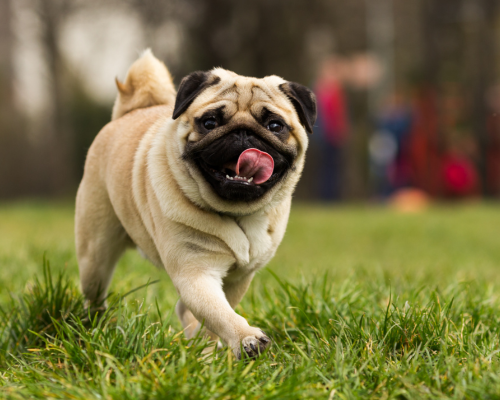Do Pugs Have Underbites? Answered!
Do Pugs Have Underbites? Answered!

Vet Reviewed

By: Sarah Hodgson
July 12, 2023
- Posted in Dogs
Table of Contents
In this article, we're going to be diving into an intriguing topic underbite in pugs. To those of you who are not quite familiar with the term 'underbite', don't you worry. We'll be getting into all of that and more! So, grab a cup of coffee, sit back, and let's dive in!
What Is An Underbite In Dogs?
Before we dive into the specifics of Pugs, let's first establish a basic understanding of what an underbite is. An underbite, medically termed prognathism, is a condition where the lower teeth protrude beyond the upper teeth. This is not just a characteristic seen in humans, but also in dogs.
In the dog world, underbites are pretty common, especially amongst certain breeds. It's a unique trait that can often make a dog look quite comical or endearing. However, it's not always all about aesthetics. An underbite can sometimes be a serious health issue that needs addressing.
While some dogs sport underbites as a natural part of their breed characteristics, in other cases, it can be a sign of dental or skeletal problems. The severity of the issue can vary greatly. Some underbites barely affect the dog's life, while others can cause discomfort, difficulty eating, or even chronic pain.
Do Pugs Have Underbites?
Now that we've covered the basics let's get to the main question: Do Pugs have underbites? The short answer is, yes! Pugs are one of those breeds that are known for their distinct underbite. In fact, it's one of the traits that give Pugs their unique, endearing look.
Now if you have been around pugs, you may have noticed that not all Pugs have an underbite. That's absolutely correct. While underbites are common in Pugs, not every Pug will have one. It largely depends on their specific genetics and overall health.
While an underbite can contribute to the Pug's charming and distinctive appearance, it's crucial to remember that it's not just a cosmetic attribute. An underbite can have serious implications on a Pug's health, which we'll delve into a little later.

Is the Pug Underbite Genetic?
The answer is, predominantly, yes. Pugs, like many other brachycephalic (short-nosed) breeds, have a genetic predisposition to underbites. This characteristic is a result of selective breeding over generations to achieve the Pug's distinct facial structure.
However, it's important to note that while genetics play a significant role, they are not the only factor. Other factors such as diet, oral health, and even injuries can contribute to the development of an underbite in a Pug.
While it's impossible to predict with absolute certainty whether a Pug puppy will develop an underbite as it grows, a look at its parents and lineage can provide a reasonable indication. If both parents have an underbite, it's quite likely that their offspring will too.
Do Pug Underbites Get Worse With Age?
As with many health issues, one common concern is whether a Pug's underbite will worsen with age. The truth is, it can. As a Pug matures, its facial structure will continue to develop and change, which can sometimes cause the underbite to become more pronounced.
However, the progression of an underbite is not the same for every Pug. Some Pugs may show little to no change in their underbite as they grow older, while others may experience a significant increase. Various factors, including the Pug's overall health, diet, and oral hygiene practices, can influence this progression.
While it's impossible to completely halt the progression of an underbite, regular vet checks and good oral hygiene can help manage the condition and ensure your Pug's comfort and well-being.
The Impact of Underbites on a Pug's Health
An underbite, while adorable and characteristic of Pugs, can have significant repercussions on their health. Severe underbites can lead to difficulty eating and drinking, oral discomfort, and even chronic pain. Pugs with pronounced underbites may also be prone to dental problems such as tooth decay and gum disease.
However, it's important to note that not all underbites are problematic. Many Pugs live healthy lives with their underbites without experiencing any significant issues. The key is regular monitoring and proactive care.
Regular vet checks are essential to ensure that your Pug's underbite isn't causing any discomfort or health issues. If your vet does identify a problem, there are many treatment options available, including dental procedures and orthodontic devices.

The Bottom Line
To sum up, Yes, Pugs do often have underbites, and yes, it is primarily a genetic trait. While an underbite can contribute to a Pug's signature look, it's more than just a cosmetic feature. An underbite can have serious implications on a Pug's health if not properly monitored and managed.
With regular vet check-ups, good oral hygiene, and proactive care, your Pug can live a happy, healthy life, underbite and all.

Subscribe to Petfluence!
Get updates on the latest posts and more from Petfluence straight to your inbox.